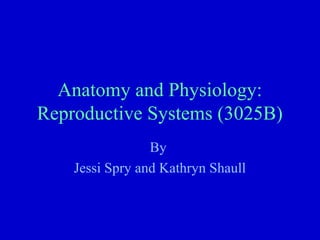3025 b
- 1. Anatomy and Physiology: Reproductive Systems (3025B) By Jessi Spry and Kathryn Shaull
- 2. General Information 1 • Reproduction is a complicated process in all species of animals http://piximg.corbis.com/cpe/256wm/101http://asnet.tamu.edu/www/ansc108/PICS/Boar.jpg53713.jpg
- 3. General Information 2 • The anatomy of both the male and female must be compatible.
- 4. General Information 3 • Physiological compatibility and timing is also required – Must have similar genetic makeup – The female must be willing in heat to accept the male – Ovum must be mature and ready to be fertilized – Dependent on the proper function of many organs
- 5. General Information 4 • Any abnormality in the anatomy or physiology of the reproductive tract result in lower fertility or complete sterility of the animal
- 6. Anatomy of the Male Reproductive Tracts • Less complex than the females. • Goal is to produce large numbers of viable male sex cells called spermatozoa. • Contributes ½ of the chromosomes to each of his offspring
- 7. Male Reproductive Tracts • After mating the role of the male is over • Reproductive organs in the various mammalian species are similar in form and function
- 8. Male Reproductive Tract-Picture http://frost.ca.uky.edu/agripedia/asc106/reprmale.htm
- 10. Scrotum • Testes or testicles in the male are the primary sex organs and are held in a sac called the scrotum – Produce spermatozoa and testosterone – Normally two testicles in a scrotum
- 11. Scrotum – Functions as a heat regulating mechanism. • 4 or 5 degrees below body temp. is essential for spermatogenesis – growth and maturation of the sperm
- 12. Testicles • Some animals only have one or neither testicle drop out of the body cavity into the scrotum – A monorchid as one fertile testicle – Although the testicle in the body does not produce viable spermatozoa, it does produce testosterone – Cryptorchid is sterile and means neither dropped.
- 13. Urethra • Begins at the opening of the bladder and is continuous with the penis. – In mature bulls, the posterior portion of the urethra is S-shaped – known as the sigmoid flexure
- 14. Urethra • Extends the penis outside of the body and into the vaginal cavity of the female so that the semen can be deposited.
- 15. Urethra – If the Sigmoid flexure does not work you have the equivalent of the sterile male – The retractor muscle retracts the penis into the protective sheath
- 16. Urethra • “Accessory Sex Glands” along the urethra include the: – Prostate Gland – Two seminal vesicles – Two Cowper’s
- 17. Urethra • The accessory Sex Glands provide a medium for the transport of the sperm from the testes to the vagina. • The Medium includes: – Adds Volume – Provides Nutrients for the sperm – Cleans and flushes out the urinary tract. – Makes a plug to hold the semen in the vagina (in some species)
- 18. Any Questions?
- 19. Important Roles of Females • Provides 1/2 of the chromosomes of the young • Nourishes young in her uterus and after birth until weaning
- 20. Female Reproductive Tract • Female Tract consists of: – Vulva – Vagina – Cervix – Uterus – Uterine horn – Fallopian tubes http://frost.ca.uky.edu/agripedia/asc106/reprfema.htm – Ovaries
- 22. Vulva • Exterior portion of the reproductive tract
- 23. Vagina • Region between the vulva and the cervix • Semen is deposited in this region in cows and ewes
- 24. Vagina Compared • Length (Vagina + Vestibule) – Cow 35-42 cm – Ewe 12-17 cm – Sow 16-23 cm – Mare 30-47 cm • Semen deposit – Cows and ewes have semen deposited here, mares and sows have semen deposited in cervix.
- 25. Cervix • “Mouth of womb” – The opening into the uterus through which sperm must pass to fertilize the egg. • Semen deposited here in mares and sows • Area stretches during birth to allow passage of newborn • Becomes blocked by mucus plug to protect it from harmful infections
- 26. Cervix
- 27. Uterine Horns • The two branches of the uterus • Fallopian tubes or ovuducts are located at the end of each horn • lined with microscopic cilia – help guide egg (ovum) to the horn • Usually the site of sperm and ovum uniting
- 29. Any Questions?
- 30. Value of Castration • Definition: removal of the testicles by either surgical or non-surgical methods
- 31. Ages for Castration • Recommended – Calves: 1-3 months – Lambs: 7-14 days – Pigs: 1-3 weeks http://asnet.tamu.edu/www/ansc108/PICS/Boar.jpg
- 32. Why Castrate • Makes male animals less aggressive and easier to handle •http://www.viewimages.com/viewimage/?imageid=102497&promotionid=1&partnerid=2&type=results
- 33. Aggression • Due to the effects of “androgens” – androgens: hormones that control the appearance and development of masculine sex characteristics • Removal of testes stops production • Primary androgen is “testosterone”
- 35. Selected Resources • http://piximg.corbis.com/cpe/256wm/101http://asnet.tamu.edu/www/ansc108/PICS/Boar .jpg53713.jpg • http://frost.ca.uky.edu/agripedia/asc106/reprmale.htm • http://frost.ca.uky.edu/agripedia/asc106/reprfema.htm • http://frost.ca.uky.edu/agripedia/asc106/uteruses.gif • http://asnet.tamu.edu/www/ansc108/PICS/Boar.jpg • http://www.viewimages.com/viewimage/? imageid=102497&promotionid=1&partnerid=2&type=results



































